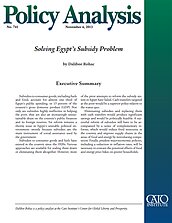Subsidies to consumer goods, including fuels and food, account for almost one third of Egypt’s public spending, or 13 percent of the country’s gross domestic product (GDP). Not only are subsidies highly ineffective in helping the poor, they are also an increasingly unsustainable drain on the country’s public finances and its foreign reserves. Yet reform remains a thorny issue in Egypt’s unstable political environment—mostly because subsidies are the main instrument of social assistance used by the government.
Subsidies to consumer goods and fuels have existed in the country since the 1920s. Various approaches are available for scaling them down or eliminating them altogether. However, most of the prior attempts to reform the subsidy system in Egypt have failed. Cash transfers targeted at the poor would be a superior policy relative to the status quo.
Eliminating subsidies and replacing them with cash transfers would produce significant savings and would be politically feasible. A successful reform of subsidies will have to be accompanied by a series of complementary reforms, which would reduce food insecurity in the country and improve supply chains in the areas of food and energy by introducing competition. Finally, prudent macro economic policies, including a reduction in inflation rates, will be necessary to contain the potential effects of food and energy price hikes on poorer households.

This work is licensed under a Creative Commons Attribution-NonCommercial-ShareAlike 4.0 International License.

